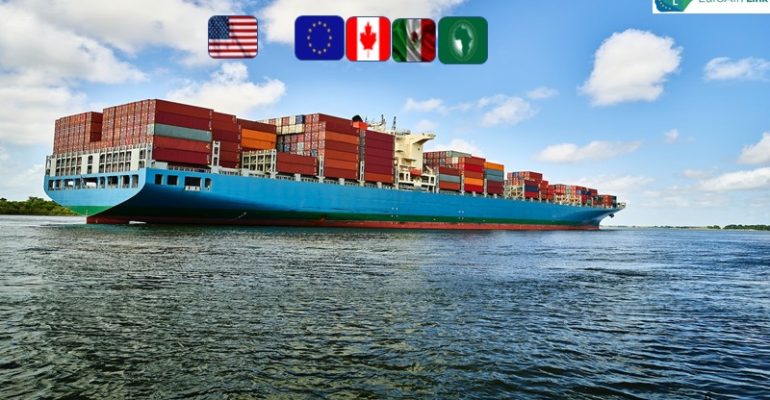The Tariff War Dilemma

The Tariff War Dilemma
Trade barriers via tariffs are detrimental to all parties involved
Today’s global economy is full of geo-economic and political uncertainties and resembles a high-stakes chessboard, where every move sparks chain reactions. At the center of this volatility is the escalating tariff war, intensified by recent U.S. trade policies. What began as a strategy to “protect domestic industries and increase revenue” under President Trump’s administration has transformed into a global showdown with no clear winners, only shaken economies, strained relationships, and anxious consumers. So, what is going on?
What are tariffs and why do they spark wars?
Tariffs are taxes imposed on imported goods. Foreign countries do not pay the tariffs imposed but the importers of the goods. The imposed tariffs are designed to make foreign products more expensive and shield domestic industries. For example, if a 10% tariff is imposed on imported mangoes say from Cameroon priced at €7 per kilo, importers either absorb the extra €0.70 cost or pass it to consumers. Spoiler: consumers usually foot the bill. While tariffs aim to boost local businesses, they often backfire because they might trigger retaliation, distort market orders, or ignite trade wars.
The U.S – Led tariff charge in Steel, Aluminum, and Beyond
In 2025, the U.S. ignited the current conflict of trade war by imposing a sweeping 25% tariff on steel and aluminum imports, targeting allies like the EU, Canada, and Mexico. These levies for example affect $28 billion in trade with Europe. These tariffs were justified by the US as protecting US manufacturers and increasing revenue. But is that what tariffs do?
However, the fallout was immediate: higher costs for U.S. manufacturers relying on these metals, increase prices for consumer goods, and retaliatory measures. The EU, for instance, struck back with countermeasures worth about €26 billion in tariffs on iconic American products like bourbon and motorcycles, increasing uncertainites between once long-standing trade partners and allies. The president of the EU- has this to say about the tariff war between the EU and US “I deeply regret the US decision to impose tariffs on European automotive exports… tariffs are taxes – bad for businesses, worse for consumers equally in the US and the European Union” Read more here.
On Wednesday, April 2, the United States imposed new “reciprocal” tariffs on a wide range of countries, with the goal of “restoring fairness and enhancing American manufacturing,” as stated by officials and outlined by CNN. Read more here.
Consumers at a crossroad: Higher prices – fewer choices

President von der Leyen of the EU emphasized that tariffs function as concealed taxes, impacting our daily lives in significant ways. These taxes are usually borne by consumers. The implementation of the tariffs triggered a significant decline in the stock market, leading to widespread panic across global financial markets. This is because when importers pass costs from tariffs to consumers, prices increase for everyday items say from cars (steel-dependent) to canned beverages (aluminum). Later spreading to other sectors like food items. Families face tighter budgets, while businesses struggle with supply chain disruptions. Worse, companies may cut jobs or relocate production abroad to escape tariffs, undermining the very jobs tariffs aim to protect. The U.S-EU trade relationship, worth $1.3 trillion annually, risks erosion thereby jeopardizing 16 million jobs tied to transatlantic trade.
It should be also made clear that the US tariffs on imports can either bring in significant US revenue or protect the US manufacturers but not both. If it brings in significant revenue it implies the US continues to import goods abroad and that is where the tariff revenue comes from. And if it protects US manufacturing then they don’t get revenue from it because the US stopped importing so it can’t do both.
Is retaliation the solution?
As the tariffs were enacted, some countries retaliated immediately, while others adopted a more cautious, wait-and-see approach. Europe for example, the U.S.’s largest trading partner, faces a dilemma. Should they impose retaliatory tariffs on American goods to pressure the U.S. to negotiate or absorb the cost while also making it difficult for EU industries to rely on imports? Trading countries like German automakers, French winemakers, and Italian machinery producers all bear the weight. Could the EU’s €26 billion countermeasures or other retaliatory actions potentially extend the duration of the war, given the uncertainty surrounding its length and the possible reactions from the US? The European Commission warns that a full-blown trade war could slash EU GDP by 0.5%, a hefty price for political strategy.
Africa’s unseen vulnerability in this drama
How does this trade war affect African businesses you might ask? While not a direct target but got involved in the “reciprocal” tariffs with countries like Cote d’Ivoire, Namibia, and Zimbabwe ( See Full list of countries by CBS), Africa faces collateral damage. As global giants clash, trade routes pivot. Cheaper steel from China, diverted from the U.S. market, floods African countries and might undercut local industries. Additionally, reduced EU-U.S. trade could shrink demand for African export goods, straining economies already dependent on the export of products. For a continent striving to industrialize, the tariff war adds another hurdle to economic stability.
See the bigger picture: A war without winners
Trade wars don’t end, they escalate. Each retaliatory tariff for example breeds another, reducing global trade and stifling innovation. According to the World Bank estimates “Global growth is expected to hold steady at 2.7 percent in 2025-26. However, the global economy appears to be settling at a low growth rate that will be insufficient to foster sustained economic development” The slow growth could be partly due to protectionism and tariffs war. For consumers, businesses, and nations alike, the cost is clear: weaker economies, panic, fractured alliances, and a less cooperative world trade order.
The Path Forward
History proves dialogue and not tariffs resolves trade disputes, a stance echoed by the EU President. Yet, engaging the current U.S. administration remains a global challenge. While frameworks like the WTO exist, their power depends on political goodwill. Tariff wars have no winners, only collective loss. The real question isn’t who “wins,” but how much the world will lose before leaders choose cooperation over confrontation. For Europe, this moment offers a chance to strengthen ties with Africa by investing in capacity-building for farmers and exporters, fostering confident trade with EU markets. For this is a good way to diversify Africa trade to the EU.
As for when the trade war’s end? Only time will tell.
— Patience Chindong

